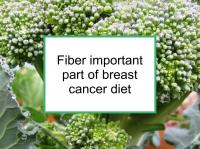High intake of dietary fiber is associated with reduced risk of breast cancer. This is not surprising since fiber is found primarily in fruits, vegetables, legumes, nuts, and seeds, most of which have chemopreventive components. However, fiber appears to have its own anti-cancer effects quite apart from the micronutrients found in various foods.
Increasing fiber intake could be particularly beneficial for those who (1) have high levels of inflammation; (2) have type 2 diabetes; (3) have high cholesterol; (4) need to lose weight; or (5) are undergoing hormone replacement therapy (HRT).
Types of dietary fiber
Dietary fiber comes from edible portions of plant-based foods that are resistant to digestion. Soluble fibers (pectins, gums, mucilages) dissolve in water and form a gel, which slows digestion. Insoluble fibers (cellulose, lignins) do not dissolve in water; they add bulk to the diet and speed up the passage of food and waste. There is some evidence that soluble fiber may reduce breast cancer risk more than insoluble fiber.
The following foods are good sources of soluble fiber while also having been found to be associated with reduced risk of breast cancer:
Please read the applicable food webpages when making your own food lists since these pages contain important advice, food rankings (e.g., highly recommended, recommended in moderation), consumption limits, and other pertinent information.
The following foods are good sources of insoluble fiber while also having been found to be associated with reduced risk of breast cancer:
Fiber is also added to some processed foods in order to qualify the foods as “high fiber” or to improve texture. This isolated or functional fiber is extracted or synthesized from plant sources. Examples include inulin (from chicory root or sugar beets), soluble corn fiber (corn), cellulose (wood pulp), maltodextrin (corn, rice, or potato starch) and polydextrose (corn starch). Such fiber-fortified foods typically lack the flavonoids and other biologically active components of fruits, vegetables, grains and nuts and may lack nutritional value, however there is no evidence that functional fiber is harmful.
Fiber and risk of breast cancer recurrence
There is very little data concerning fiber intake and risk of recurrence in breast cancer survivors. A 2011 U.S. study designed to investigate the associations between dietary fiber, carbohydrates, glycemic index and glycemic load and breast cancer prognosis reported an inverse association between fiber intake and overall likelihood of death (from any cause). However, no additional benefit was observed for fiber intakes above 9 g/day, indicating a threshold effect. Fiber intake also was found to be inversely associated with breast-cancer specific death and risk of non-fatal recurrence or second breast cancer, but the results were not statistically significant.
How fiber influences breast cancer
Most fiber-rich foods contain a variety of compounds that could influence breast cancer growth and development. Therefore, it is difficult to determine whether fiber, per se, has anticancer activities. However, researchers have attempted to solve this puzzle and provided the following explanations of fiber's role:
- Fiber increases frequency of bowel movements (bowel motility), which in turn reduces breast cancer risk by increasing estrogen excretion. Circulating estrogen levels are an established risk factor for breast cancer.
- High fiber intake reduces serum cholesterol levels. There is some evidence that high cholesterol promotes breast cancer.
- Diets high in fiber reduce circulating C-reactive protein, a marker of inflammation. Inflammation is thought to increase breast cancer risk and worsen its subsequent prognosis.
- Fiber intake reduces weight gain for similar levels of calorie intake. Overweight postmenopausal women are at increased risk of breast cancer and recurrence compared to normal weight women.
- A high intake of dietary fiber, particularly soluble fiber, improves blood sugar control and reduces excess circulating insulin (hyperinsulinemia) in patients with type 2 diabetes. Hyperinsulinemia is associated with increased risk of breast cancer and recurrence.
Sources of information in this webpage
The food lists and other information above, which are updated continually as new research becomes available, have been developed based solely on the results of academic studies. Clicking on any of the foods will take you to its webpage, which contains specific information concerning that food's relationship to breast cancer, including its overall recommendation, as well as links to supporting studies.
Below are links to 20 recent studies concerning dietary fiber and breast cancer. For a more complete list of studies, please click on the tag fiber.
